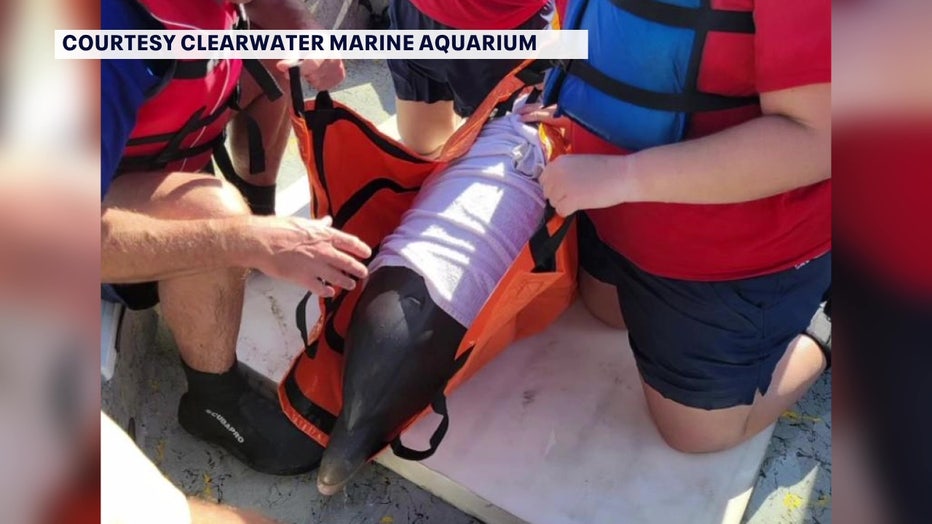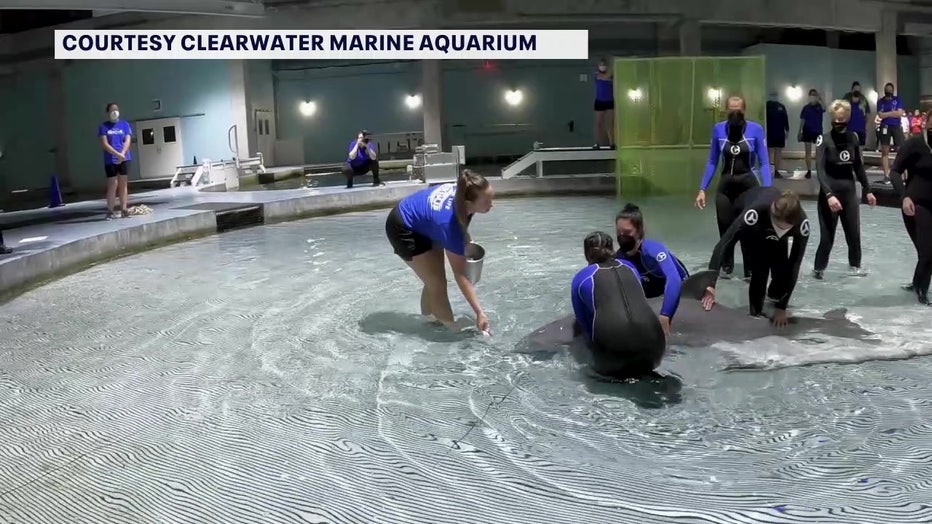Newest Clearwater Marine Aquarium dolphin rescued after years of human interaction caused health decline
CLEARWATER, Fla. - The Clearwater marine Aquarium's newest dolphin, Izzy is getting adjusted to her new home after moving on Friday. NOAA and its Texas partners rescued the dolphin from North padre Island in June after years of human interaction caused her health to decline.
Izzy will spend the rest of her life at the aquarium because of the toll human interaction took on her, Erin Fougeres, the marine mammal stranding program administrator for NOAA's Southeast region, said.
Fougeres said Izzy lost her weariness of people and boats. She said the rescued dolphin had been hit by boats and relied on feeding from the public, and because she didn't know how to forage on her own, she was becoming thin.
After Izzy lost eyesight in one of her eyes, Fougeres said they ultimately had to capture her for her own safety and help her rehabilitate from her numerous injuries. Fougeres said NOAA tried to protect Izzy over the course of three years after first spotting her in 2019.
People would swim with Izzy, ride, jump on, feed and pet her. The interactions were posted on social media, which caused more people to find Izzy, Fougeres said.
"She’s a wild dolphin. She deserves to be in the wild, but because of human interaction and human activity, she’ll never be able to be a wild dolphin again," Fougeres said.
Kelly Martin, CMA's vice president of zoological care, said they are seeing more interactions with animals due to humans.

READ: Winter the dolphin dies, leaving legacy of perseverance and inspiration
"Unfortunately, people might not understand that interacting with these animals out in the open ocean can be detrimental to them, the human, but also to the animal," Kelly Martin, CMA's vice president of zoological care, said. "Unfortunately, if we are feeding these animals, the natural instinct to forge for their food or find might be replaced with one in which humans are providing that food source until we’re not there and then in that case, we’ll see malnourished or undernourished animals which could then lead to illness or sickness."
Fougeres said it's illegal to harass or take wild dolphins, which includes disturbing their behavior, hunting them, injuring them.
"It is illegal under the Marine Mammal Protection Act. You should never feed a wild dolphin, swim with a wild dolphin, try to pet a wild dolphin," Fougeres said. "It is really imperative that we try to keep these wild dolphins wild, which is a really unfortunate outcome of Izzy’s situation."
Penalties for interacting with marine mammals include fines up to $100,000 and prison for up to one year.
CMA's rescue team has responded to 23 dolphin stranding so far this year from Pinellas to Levy County. Twenty dolphins were found dead and three were found alive. That's up from 18 stranding last year.
MORE: Winter's legacy: Dolphin rescued from Space Coast now lives at CMA
Martin said it doesn't mean that each of the cases of stranding were due to human interactions, but there is an increase, and it's something to look at. She said they work with the Marine Mammal Stranding Network and give their data to researchers each year to discuss how to tackle the issue.

"The number of animals that we’re seeing come in is enough to take note," Martin said. "I wouldn’t necessarily say that it’s at an alarming rate, but it’s enough to take notice and really dive deeper into the cause."
Martin said marine mammals can be dangerous for humans too.
"You don’t think about it, but they like to roughhouse like our dogs and our cats," Martin said. "They have teeth. They have very strong bodies. They’re a little more agile in the water and all of those things can really lead to something that’s detrimental to humans."
Fougeres said NOAA sees more human interactions with marine mammals in Southwest Florida, in the Panhandle and areas where recreational boating is more popular year-round. She said they get reports from the public and are able to identify types of human interactions when animals are stranded. Fougeres said they often see marine mammals caught in fishing line and hooks.
"We need to make sure that we appreciate these animals from a far," Martin said.
You can call NOAA’s enforcement hotline at 800-853-1964 to report potential violations. You can also call trained responders at 877-WHALE-HELP if you see an injured or dead marine mammal.

